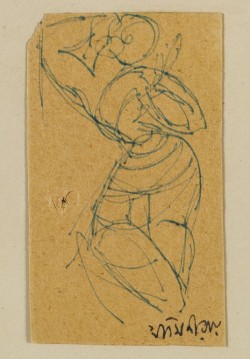by Bhargavi Chandrasekharan
Twelve years, does it count for anything? Anything at all?
The polished mirror with its intricate wooden carvings had stood the ruthlessness of time. Kannagi ran her fingers over the chiseled wood, tracing the sturdy wooden roses, wooden jasmines, wooden climbers and their wooden leaves. She carefully avoided stumbling upon her own reflection, even accidentally. She peered into the mirror, pressing her face against the wooden roses and their wooden friends. “Scorching round eyes, thick lips, rotund figure and brown skin – attractive, aren’t I?” she wondered, and wore her earrings.
“Madhavi…how beautiful!” she exclaimed wistfully.
Kannagi had heard stories of Madhavi’s enchanting beauty from her friends before. She had heard her husband, Kovalan, praising Madhavi for her extraordinary skills in music and dance. In all these ten years of Kovalan’s absence from her life, never once did Kannagi bother to scourge information about their love affair. The day she heard about Madhavi’s relationship with her husband, Kannagi simply removed her ornaments, one after the other. Kannagi’s mother had bellowed in horror, “Your husband is still alive, Kannagi, don’t you dare remove the sanctimonious symbols of marriage!” Kannagi had nonchalantly brushed off her mother’s views, pointing towards her ankles, “these sillambu, anklets, were his pet peeve,” and smiled, without twitching her lips.
Even this morning, when her hand maid brought her an artist’s rendition of Madhavi, Kannagi showed her stoic face, as always. The maid hesitantly added in a low voice, “In this image…as Madhavi is dancing, there is a portrayal of a man at her feet, kissing her… anklets.” Kannagi stirred, a little, and ordered her away. She mounted the painted parchment between the frames of the mirror. A lithe female dancer, oozing sensuality, enticed her.
Kannagi had barely covered her breasts with a crumpled silk towel, but the long strings of necklaces and beads, outlining one another, and the golden armlets she wore, had created an illusion of a bead jacket. She fluted the beads with a heavily encrusted waist-belt, followed by a carefully pleated saree which doubled as a dancer’s trousers. She darkened her eyes jet-black and sweetened her lips with saffron and cherries, and smiled.
“Madhavi, you do look beautiful!” she mouthed softly and attempted the posture in the painting, hips and legs bent in the famous tri-bhanga stance, fingers trying to portray a bee suckling a half pouted flower. Kannagi stood entranced at her own transmogrified reflection temporarily, and hummed the tune that Kovalan loathed deeply.
*
“Thannanee….”
Kovalan clucked his tongue, “Kannu, why would you even attempt croaking right at the start of the day. Anyway, since you wished…” he elaborately improvised on her tune adding, “this, my darling, is palaip pann, the tune of melancholy, I prefer happier tones though.” Kannagi stared at her anklets.
(“Do you mean, you prefer adulterously romantic tones?” she didn’t say)
“Not as simple to grasp as your folk tunes, is it?” he continued.
Kannagi continued staring.
(“Why does your puritanism have to interfere with my nativity? Art is art. Period,” she didn’t say)
“Tell me, kannu, do you have a life outside this kitchen? And the bedroom, of course,” he smiled tantalizingly.
(“For you to extol your expertise in art, you still need to eat. Cooking is an art, by the way. Amusing that a two timer like you has the guts to even talk about…” she didn’t say)
Kannagi was temporarily distracted by the hungry voice of the mendicant outside. “Dismiss him,” Kovalan bellowed. Kannagi flew into the kitchen, served the mendicant a bowl of rice and stood in front of her irritated husband, her eyes still fixed upon her anklets.
“You are a pathetic excuse to life. Can’t you remove the annoying anklet? It’s as noisy as you. A-R-T…can you spell? Speak up!”
(“I prefer the art of silence, unenlightened Ko” she didn’t say)
“Oh, yes! You are Kan–nagi, are’t you? The one whose eyes smile? Is that the name they confer on gnanashunyas, the imprudent fools?”
Kannagi folded the betel leaf with a bit of areca nut stuffed in it and served to him wordlessly.
“Of course, tasteless,” he muttered under his breath, “no, not the leaf” he added. He didn’t notice the tear-filled eyes of Kannagi.
*
“Thannanee….” hummed Madhavi, strumming, her long dark mane falling over her shoulders like the strings of lyre, unmindful of the discordant notes in her song. She waddled, skipped and hopped through the room, dancing to the rhythm that played exclusively to her ears.
“I am Madhavi, the exquisite peacock
I am Madhavi, the melodious nightingale
I am Madhavi, the perennial Kaveri
I am Madhavi, the ethereal Kotravai”
She sang, incoherently, in the romantically tragic palaip pann. The thud of her heart grew increasingly wild and pierced her ear drums.
A familiar voice kept calling her name from the depths of the ocean. “Kannu, I am sorry, open the doors, I beg thee!”
Madhavi looked at the wooden framed mirror. The sultry, content and supremely confident Kannagi winked and smiled at her, without twitching her lips.
Pic: Painting by Jamini Roy, circa 1943






